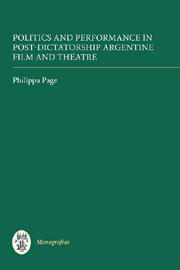Book contents
- Frontmatter
- Contents
- List of Illustrations
- Dedication
- Acknowledgements
- Introduction
- ‘Theatre[s] of Cruelty’ and Politics of Performance in the Work of ‘Teatrista’ Eduardo Pavlovsky and Filmmaker Fernando E. Solanas
- De-mythifying the Postmodern ‘Opium of the People’: Theatre and Cinema versus Television
- ‘Metáforas del Fracaso’ or ‘a Family Romance’? Resuscitating Aesthetic Lineages
- Biodramas/Biography/Biopolitics:Projects of ‘Convivencia’ in New Argentine Cinema and Theatre
- Conclusion
- Filmography
- Bibliography
- Index
Introduction
Published online by Cambridge University Press: 05 February 2013
- Frontmatter
- Contents
- List of Illustrations
- Dedication
- Acknowledgements
- Introduction
- ‘Theatre[s] of Cruelty’ and Politics of Performance in the Work of ‘Teatrista’ Eduardo Pavlovsky and Filmmaker Fernando E. Solanas
- De-mythifying the Postmodern ‘Opium of the People’: Theatre and Cinema versus Television
- ‘Metáforas del Fracaso’ or ‘a Family Romance’? Resuscitating Aesthetic Lineages
- Biodramas/Biography/Biopolitics:Projects of ‘Convivencia’ in New Argentine Cinema and Theatre
- Conclusion
- Filmography
- Bibliography
- Index
Summary
The overriding feature in Argentine theatre and cinema of the post-dictatorship period is without doubt the anxiety to re-establish their agency as politically and socially engaged art forms: to recover the Utopian sense of passion and engagement that both theatre and cinema had experienced during the 1960s and early 1970s. ‘Era una época muy rica, muy llena de pasión,’ recalls playwright Ricardo Halac, lamenting the ambivalence of the post-dictatorship period, whilst remarking that one of his plays written in the 1960s was even rejected because it failed to represent young people endeavouring to change reality (in Osvaldo Pellettieri 1989: 21). Halac characterises the period when he comments that ‘el teatro tenía que tener un gran contenido social porque ayudaba a concientizar a la gente, y ayudaba al cambio social’ (20). The 1960s has gained the mythical status of ‘la década prodigiosa’, during which many young artists throughout Latin America, inspired by the Cuban Revolution, believed that change could be achieved (Blas Matamoro, in Pellettieri 1989: 35). Whether playwrights found themselves influenced by the aesthetics of naturalism and reflexive realism or by the opposing aesthetic of the absurd, such controversies enlivened debate on how to approach what effectively boiled down to the same collective anxiety: ‘cómo vincularse con una sociedad tan áspera como la Argentina, tan dura, tan en crisis permanente, tan desalentadora’ (Kive Staiff, in Pellettieri 1989: 25).
A similar discourse exalting cinema's capacity to incite change was expressed in Fernando Solanas and Octavio Getino's manifesto for an anti-systemic, revolutionary ‘Third Cinema’ (1997: 33–58).
- Type
- Chapter
- Information
- Publisher: Boydell & BrewerPrint publication year: 2011



